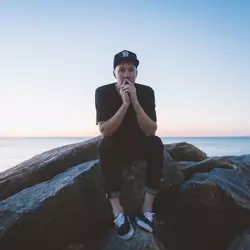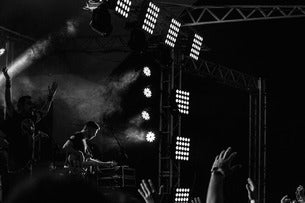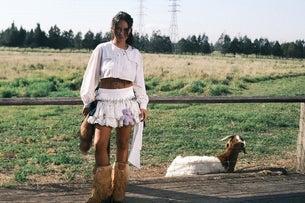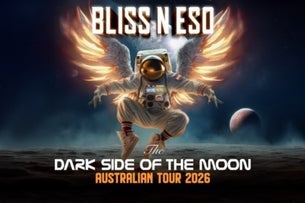 Drapht
DraphtOn Friday 22 April Australia woke to news that rocked music fans and industry professionals alike to their core. His Purpleness, Prince, has died overnight.
Sitting in a stuffy photography studio in Alexandria, Paul Reid (Drapht) and Grace Shaw (Mallrat) have some time to kill while preparations for the shoot go on — popcorn and fairy floss scent the air with a festivity at odds with the general atmosphere in the room; we're tired, we're shaken from the news about Prince, and young gun Gill Bates is MIA.
It seems not everyone is feeling the strain — Shaw bops around to her Spotify playlist (The Jackson 5, The Weeknd) while zapping texts and Facebook messages off to Bates, who is a friend from "just hanging around the Brisbane scene". Two hours later he rushes in — "The plane came late and I lost my phone on tour," he explains sheepishly. "I got to the airport and I was like, 'hang on, what do I do now?' You know what? I should have been more prepared, that's on me!" He's self-deprecating, bubbly and we all forgive him instantly.
Sitting in the props room, our first question garners a reaction from all three that is almost drowned out by a sudden clap of thunder and pounding rain on the plastic roof overhead. "You started with 'Aussie hip hop'!" Reid laughs incredulously over the noise while Shaw tries to placate a suddenly uncertain interviewer: "Don't worry, " she yells in earnest. "Read out your question, I want to hear it!" Defence is futile. Traditionally Australian hip hop is seen as "so boganised", muses Reid. "[It's] how backwards a lot of the fan base can be. Racism, specifically, and a lot of ignorance. From the fans, from old artists, from purists. The whole Aussie hip hop branding just grinds me every time. But I feel like it's evolved from that now," he explains. "When you call it 'Aussie hip hop' it's like, okay, what's Aus-sie hip hop. Like, it's just hip hop that comes from Australia!" laughs Bates as he chimes in. "More than anything Aussie hip hop speaks truth; it's about raw honesty, which I think makes it different," Reid adds.
"I had tickets. And then the week went by and I realised I had something crucial on that night and I couldn't go. And now I will never see Prince."
The conversation inevitably turns to Prince's death, and Shaw's honesty shines through when she admits that she never really listened to his music. Reid, on the other hand, laments the loss to the hip hop scene evident from a single scroll through his phone. "Social media right now, Instagram, man. Every one of the people I follow — Prince, Prince, Prince, Prince, Prince. I think maybe because of my demographic and genre, I think Prince maybe had a bit more effect on the soul element of hip hop." He tells us, much to our horror, about a missed opportunity to see Prince's last show in Perth two months ago. "I was gutted. I had tickets. And then the week went by and I realised I had something crucial on that night and I couldn't go. And now I will never see Prince. It sucks. I totally thought there would be a next time."
Don't miss a beat with our FREE daily newsletter
Social media becomes a topic of conversation between Reid — "I'm 33, damn" — and the young 'uns. We're all flabbergasted at 17-year-old Shaw's lightning trajectory into the industry. Thus far she has only written and released two songs, Suicide Blonde and Sunglasses, and Reid gives her some well deserved commendation on billing Come Together Festival within such a short time of walking onto the industry stage. "Like, two songs, that's it? That's awesome, you should be really proud of yourself." Shaw, true to her generation, has gained much of her trajectory through "the Internet" and social platforms. "Social media is great for the artist because it's a direct line to their fans; it's a really powerful platform. But it's [also] really great for collaboration — you can work with people from remote areas of Australia and it's no hassle at all," she enthuses. Reid is, admittedly, terrible at social media. "I try so hard. I'm totally inept with the social media aspect of my brand." But despite his short-comings in this area he retains the responsibility of posting his own content. "Drapht is me, and I've tried [my manager posting], and then I'll see them and I'm like, 'You can't say that, that's not a reflection of me!' I've gotta adapt to the change, because that's what life is."
Despite so many Australian festivals packing up their tents for the last time over the past few years, all three are pretty hopeful about the fate of Come Together, which has undergone a number of changes since its inception in 2005, morphing into the one day hip hop centric event at Luna Park that they'll all perform at on 11 June. Shaw is keen to see the hip hop community embracing more female performers, "There's always going to be bullshit, [but] I think it's really empowering to be like, 'I don't actually care, I'm here to have fun anyway'. It's great that we're seeing more representation and diversity in artists."
"It's all based upon that '90s hip hop mentality — the ghetto street genre — but we're not in New York. We're not Americans."
Hip hop itself is experiencing a cross pollination of genres. Reid jokes about the purists "who are always angry" about the current transitional state of the art. "It's all based upon that '90s hip hop mentality — the ghetto street genre — but we're not in New York. We're not Americans. To be able to express yourself, no one should say 'these are the rules and regulations for hip hop' and you're in this confinement. Like that's silly, but that's been the mentality for the past 15 years." Hip hop is now "definitely overlapping with everything" says Shaw, "and that's partly because of the Internet — you can put shuffle on your iPhone and it's all mixed up together."
Bates is extremely quiet during our group chat, barely putting in a word and staring at his feet, but I grab him on the phone a few weeks later and he talks my head off for half an hour. He's shockingly energetic and charismatic, which begs to question why he experiences social anxiety. "Yo totally, totally. Confidence is something I really struggle with. When I said 'stuff like this isn't supposed to happen to me'…" he pauses and seems to gather himself. "My dad was kidnapped when I was two years old, so we don't know if he's alive or dead. We don't know. Growing up [in Eritrea — North East Africa] was so hard. [But] my mum's suffering the worst because her first husband was killed by the same people that took my Dad. The government is real corrupt, and eventually my goal is like…" he fades off, instead explaining a reason for his insecurity: "Me talking about all this lovely dovey stuff — I feel like I'm doing my family an injustice. There's bigger fish that I should be frying right now, and here I am talking about these heartbreak things. [I should] show people that there's bigger stuff in this world."
Reid, who talks spiritually about "honest self expression" and finding "your truth", has some man to man advice for Bates. "You can't just come out and put so much weight on yourself, like 'I need to be this mature person' when [Bates] is only in his 20s. All that comes with time, there's no expiry date on an idea or [something] that you've lived. He can go back to that certain part of his honest self when ever he wants to."
























